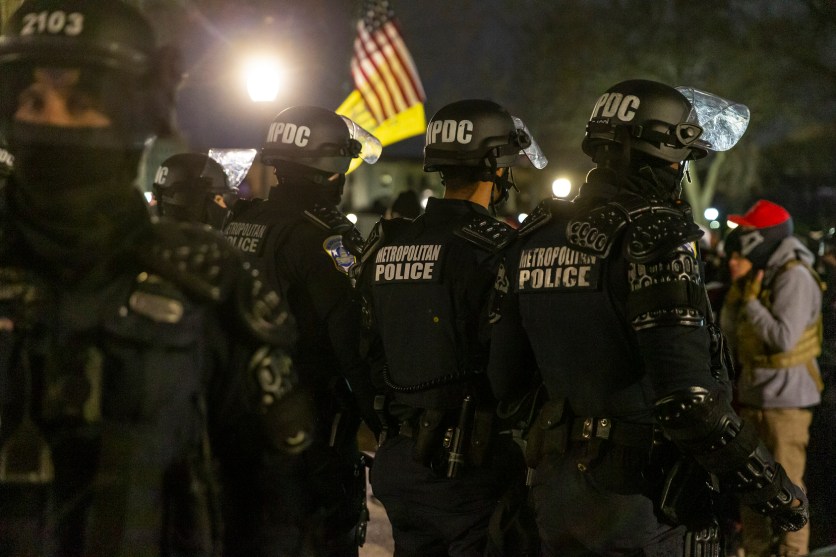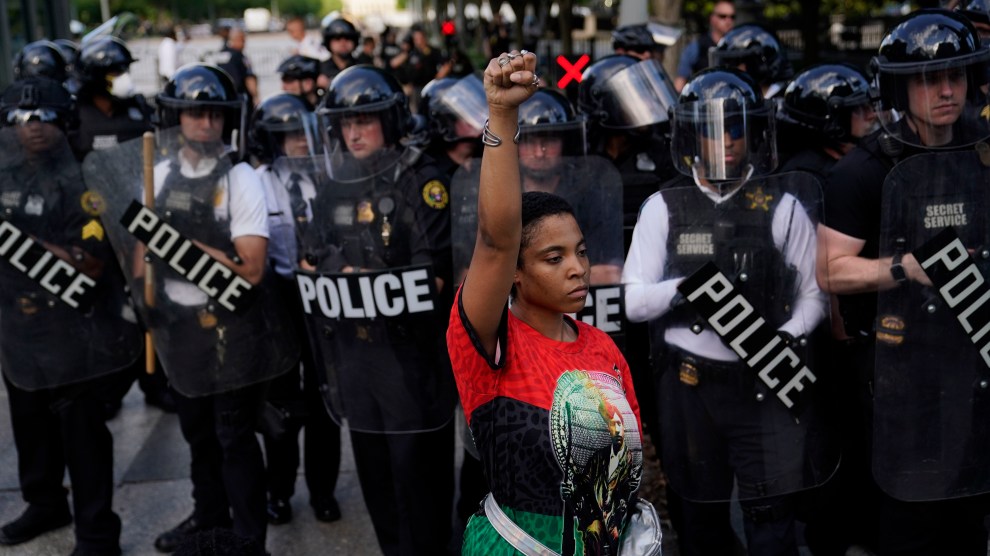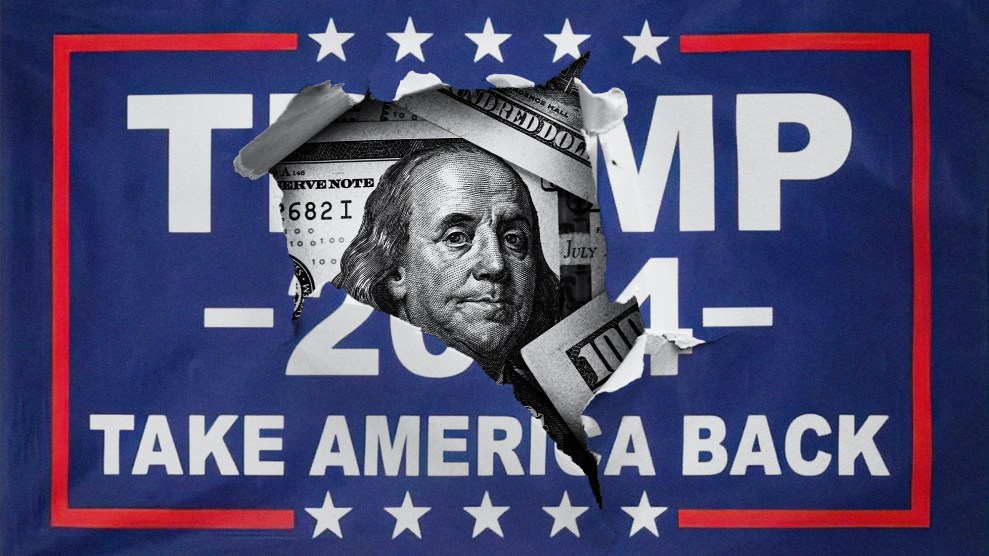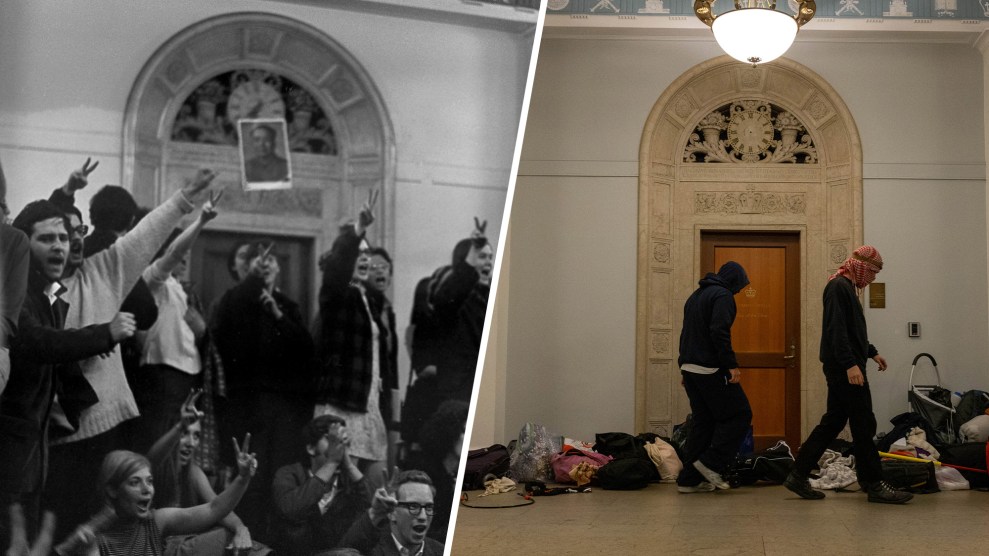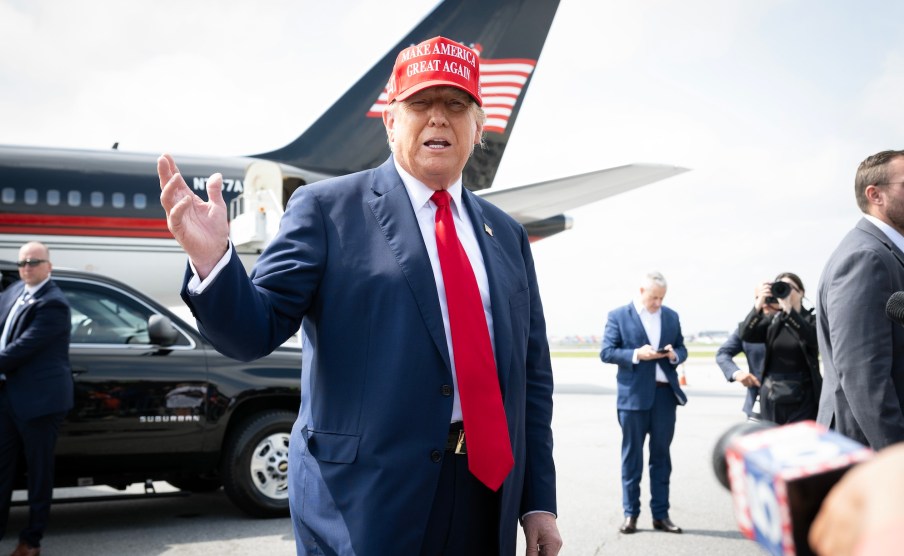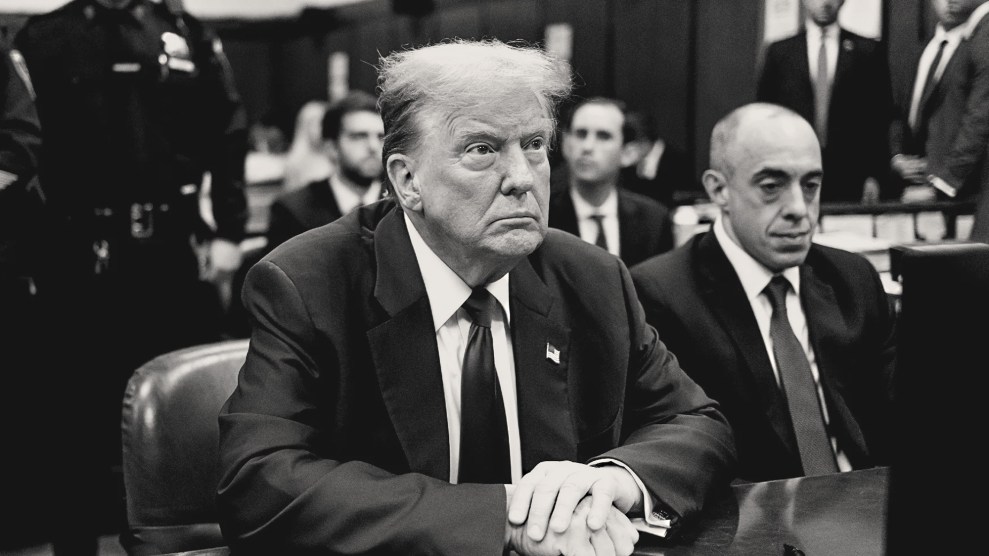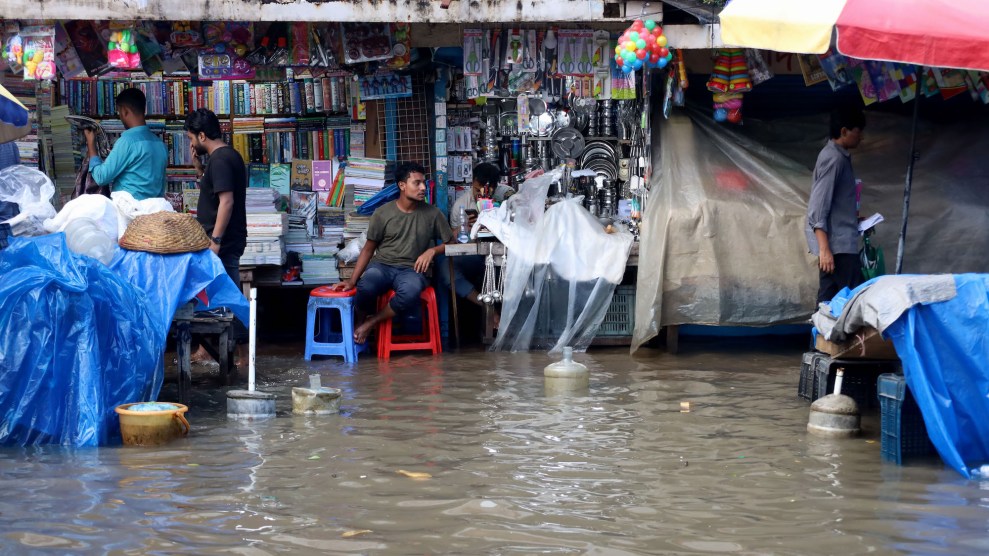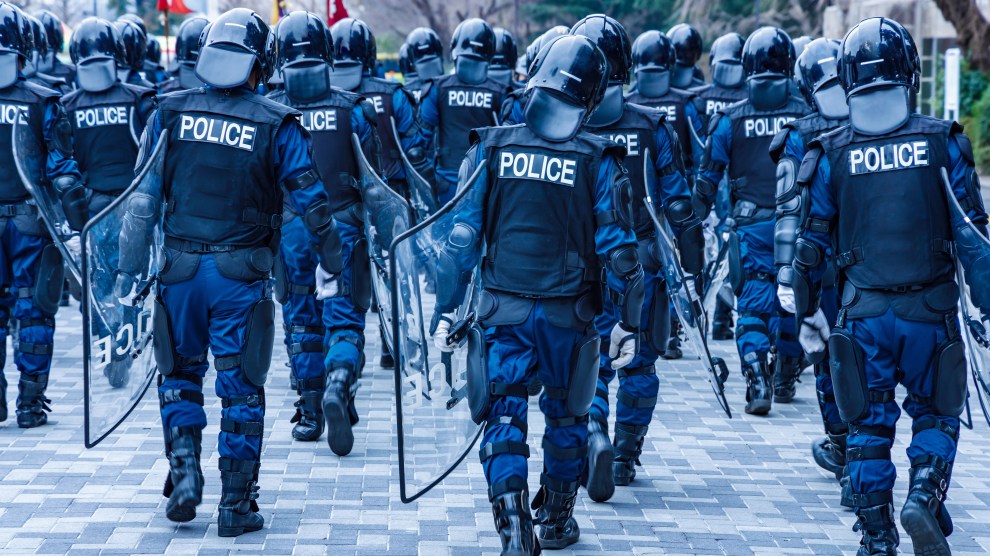
taka4332/iStock/Getty Images Plus
It’s hard to forget the image: Thomas Robertson and Jacob Fracker, two off-duty Virginia police officers, pose for a selfie in the US Capitol, one of them raising his middle finger to the camera, as throngs of Trump supporters ransack the building to try to stop lawmakers from certifying the presidential election. The photo circulated widely on Facebook and other social media platforms in the days following the January 6 mob.
As a result, the two officers were fired this week from the Rocky Mount police department, and they’re now facing federal charges. It’s likely they weren’t the only cops to join the insurrectionists: Police departments around the country are also investigating more than a dozen off-duty cops who allegedly participated in the violent mob, and examining allegations that other officers attended the rally in the hours beforehand.
But waiting until after an armed insurrection to investigate officers with extremist views seems like far too little, too late. In the wake of the Capitol attack, legal scholars and activists argue that police departments should do much more to rid their teams of racist officers, including by regularly screening their social media posts. “They should be searching their emails and text messages for key words associated with far-right extremism and racial animus,” says former DC public defender Vida Johnson, an associate law professor at Georgetown University who has studied white supremacist infiltration of police.
In recent years, the Plain View Project, a collaboration between a Philadelphia lawyer and journalists at the nonprofit Injustice Watch, has documented around 5,000 bigoted social media posts by accounts belonging to current and former law enforcement officials. These days, many more posts are coming to light: One of the Virginia officers who posed for the Capitol selfie gave clues on social media weeks before the mob, writing on Facebook in December that he was prepared to start an armed rebellion, according to an FBI investigation. The other Virginia officer sent social media messages to a friend afterward, bragging that he’d peed in House Speaker Nancy Pelosi’s toilet. “[I]t was f***** amazing,” he wrote. (Both officers now say they did not participate in any violence or property damage in the Capitol.)
I spoke with Johnson about some simple solutions that police departments could adopt to crack down on bigots with badges after decades of allowing them to patrol the streets.
What was your reaction to the news that off-duty police officers joined the mob that stormed the Capitol?
Obviously I was shocked by the scale of what happened, and more than a little bit scared. I definitely was not surprised.
Police departments around the country are now investigating some of their officers who were in DC that day. Do you have any thoughts about these investigations and the way discipline is being handled?
It’s a great step that departments are actually taking a look at their officers who were involved. Unfortunately, we’re not going to know much more than what they share with us. Because of collective bargaining agreements between municipalities and police departments, and also confidentiality statutes, we don’t know an awful lot about police officers and the kind of discipline they’re exposed to. The Capitol Police is one of the most opaque police departments, but there aren’t a lot of police departments that are particular transparent. So we’re not going to know a lot about what kind of investigations are done. I find that worrisome.
What should police departments be doing to root out racist police?
One of the problems we saw on January 6 is that there’s a disproportionate number of people on police departments who hold far-right views. Really, it’s not a surprise. Ten percent of the [total US] population believes it’s okay to hold neo-Nazi views. Twelve percent of the population, based on a Reuters poll, said they support the rioters. You have to assume an even bigger percentage of people currently in law enforcement hold those types of beliefs. Whether they act on them or not, it’s going to color the way they see the world and the way they police communities.
We know that white people are overrepresented on police forces, and that needs to change. It’s not to say Black officers are all good or white officers are all bad, but it’s definitely something we need to look at. This is just anecdotal, but when you look at who was taking selfies with the crowd, they were the white officers. When you look at who acted heroically, and lots of officers acted heroically, but the person we think of is that Black officer who led the rioters away from Congresspeople who were only feet away. So we need to diversify police departments.
We also need better background checks of police officers—more personality testing of new hires. There’s this horrible story of a Little Rock, Arkansas, officer who was completely honest during hiring when he said he attended a KKK rally when he was a teenager, and he was hired anyway, and he went on to shoot and kill an unarmed teen there. So we can’t just do background checks; we have to not hire people who set off alarm bells.
Another thing that hasn’t happened is that we need to check in on officers periodically during their tenure in the police department. I use this example: We don’t give someone a driver’s license when they’re 16 and say, “Go ahead. You can drive for the next 70 years.” We check in on them to make sure their eyes still work, that they’re thinking clearly, that they don’t have dementia. Every year or two, police departments should be doing social media checks, having [officers] come in for new rounds of psychological testing. They should be searching their emails and text messages for key words associated with far-right extremism and racial animus. Police officers need to agree to a social media policy that makes it impossible for them to spew hate online, and they need to be fired when they violate it.
It is really difficult to fire police officers due to a lot of agreements that municipalities have made with police unions, and that needs to change. Because until it is easy to fire a police officer who crosses a line or violates the law, we are going to continue to have this problem. Good officers have no incentive to tell on officers [who commit misconduct], because at this point they have every reason to believe those officers will be on the force the next day or the next year.
In one of your papers, you argue that police departments have a legal obligation to regularly screen officers. Can you talk more about that?
Both police departments and prosecutors’ offices have an obligation under something called the Brady doctrine. There’s a case called Brady v. Maryland that was a Supreme Court case several decades ago, and it said the government—and the government means both prosecutors and police—has to turn over any information that’s favorable to the defense for use by the defense at trial. For example, if a complaining witness in a case has a prior conviction for perjury, that’s something they need to turn over to the defense so that the defense can cross-examine that witness with that information. Similarly, I argue that issues of police discipline and anything else you could cross-examine a police officer about should be turned over to the defense.
Many prosecutors’ offices already do this. The US Attorney’s Office in DC and the San Francisco prosecutor’s office turn over issues of police discipline to the defense for use at trial. But what they’re not doing, and should do—all prosecutors’ offices should—is some social media checks to see whether these officers hold any biases against the communities they police. So for example, in the OJ Simpson trial, basically the way the defense won that case was by showing that the main detective had used a racial epithet toward Black people in the past, and he lied about it on the stand, and then they cross-examined him with it. That shows how effective that kind of cross-examination can be. So that’s something that police and prosecutors need to do more seriously.
But there’s not a lot of incentive for prosecutors to do these kinds of in-depth looks at police officers because they don’t want to ruffle police officers’ feathers, because they rely on them so much. They don’t want to step on police officers’ toes. That’s a problem.
We really need independent people looking into both prosecutors’ decisions on whether to prosecute police officers and also the issue of officer discipline. A good police department would pay an outside group to do an internal review of the social media policies, searching for emails and text messages of police officers. Because you’re more likely to root out the problem when you don’t have people who may have been to an officer’s daughter’s birthday or wedding being the one looking into whether they should stay on the force.
Under the Brady doctrine, is the government required not only to hand over information to the defense that it’s aware of, but to actively be searching for information about these officers?
With the proliferation of social media platforms as a way to communicate, and the fact that officers are texting with one another rather than using their recorded radio channels to communicate, I think we’re at a point where to not look into these things is like putting your head in the sand. As long as other officers know this stuff, then the prosecutor is on notice to look into it. So I think yes, the law says they need to look into it. Not everyone would agree with me.
Are there any outside groups already doing these social media checks, or any that would be well tasked to do this?
Not that I’m aware of. We do it in other instances: We appoint special prosecutors—calls for this usually come in the wake of a police shooting, where a local prosecutor doesn’t prosecute a police officer. But we really need to think about this more broadly. Otherwise this problem is going to continue. It was back in 2006 that the FBI warned of the infiltration of white supremacists in police departments, and almost nothing’s been done to curb the problem. We’ve let it just grow for almost 15 years.
Even if police departments had to do these social media investigations themselves, wouldn’t they be pretty well equipped to do it? Since they already have teams of people who analyze social media posts of suspected gang members or people suspected of criminal activity.
Yeah, big police departments do. But it’s so easy to scrutinize someone different than you. It’s a different matter to dive deep into someone who you know well. The tendency is to give them the benefit of the doubt, cut them some slack. You try to read a different meaning into what their post says. So I think we don’t want to leave it to other police officers who may have known the officer they are looking into since they were a cadet. Or they’ve been to the bar with them, they’ve been to each other’s weddings. That’s a recipe for more of the same.
You’ve heard the story of the officers in Wilmington, North Carolina, over the summer. One of them accidentally activated his body cam, and it caught this whole conversation between several officers who were dreaming of a race war and of wiping Black people off the map, and referring to a Black woman they’d arrested earlier that day as the n-word. There were multiple officers having this type of discussion. And the only way it was discovered was because someone happened to be independently reviewing body camera equipment to see if it worked. It wasn’t that one of the officers who was more quiet was like, “God, these guys are scary.” No. Those guys just continued to work together every day.
There was another story of officers in San Jose over the summer. One of them posted, “I say re-purpose the hijabs into nooses.” This was on a Facebook group with other officers. Why would he feel comfortable posting that unless he knew his back was covered? The culture of policing is that you don’t tell. There’s this blue wall of silence. And until that is destroyed, you’re going to continue to have this problem.
I’ve seen the term “ghost skins” in some articles, referring to officers who are white supremacists but don’t openly display their beliefs; they try to blend into society and further their agenda that way. How common is that?
It’s so hard to know how common any of this is. But that’s precisely what that 2006 FBI report warned about. Police officers have access to sensitive information. For example, they might know if they’re looking into the Proud Boys or the Three Percenters or the Oath Keepers, so they can tip them off. That’s one reason why careers in law enforcement are so appealing to people who hold far-right belief systems. They get this opportunity to not only police people of color, to control their goings and comings and how they live their lives, but also they get this inside information about whether [far-right groups] are in fact being investigated.
There’s an argument that departments can’t fire officers simply for having white supremacist beliefs—it has to be about behavior, which I think could include social media posts. Do you have any thoughts on that?
Well, we can never know what’s in someone’s mind, but certainly we can fire them when they act on their white supremacist views, like publicly posting something or texting something to another officer, because that impacts the behavior of others. There are cases that say that an officer might have a First Amendment right to express some of his views, but his right to express those views don’t outweigh the police department’s interest in a good relationship with the public. Anything that undermines the integrity of the office is grounds for dismissal.
You previously worked in DC’s public defender office. Did you encounter any cases there that involved racist police that got you wanting to study this more?
In my time as a public defender, I saw all sorts of instances of racial bias. Our clients were 95 percent Black in a city that’s less than 50 percent African American. But in terms of explicit bias, it really wasn’t until I had the time as an academic to sit back and think about this problem. I was at Georgetown—I teach a clinic there. Our students represent people in Superior Court. And there was a police officer who wore a T-shirt with a symbol on it that’s connected to white supremacy. The middle of the shirt showed an angel of death, like a Grim Reaper, and in one hand he was holding a rifle, and in the other hand he was holding a Metropolitan Police Department badge. This officer wore the T-shirt to court; that’s how it was discovered.
At the same time I heard about a scandal in another police department about some racist text messages—it might have been Miami. That’s what connected all the dots for me. The thing about the T-shirt that really troubled me is that it showed that this white officer saw himself as not a public servant to this community that he was policing, but as an angel of death, as someone at war with them. Someone who’s goal was to intimidate them. And then ultimately it was discovered that there wasn’t just one of these T-shirts—the entire shift had these. And some of those officers were Black. So whether it’s racism or not, there’s a problem in police culture where they don’t see themselves as servants of the community.
That reminds me of another case you mentioned in your paper, in Cincinnati, of the officer who had the—
—the Confederate flag…
Yeah, he wore a Confederate flag T-shirt underneath his uniform, and the judge wouldn’t allow that to be considered as evidence in the trial.
Evidence of racial bias. Ah! The other thing that’s really crazy about that T-shirt [in DC] is he wore it to court. Just think about how comfortable you are in your job that you think you can wear a T-shirt like that. One that shows you as an angel of death. It was the Seventh District, which is one of the Blackest precincts in DC. It was the 12 a.m. to 8 a.m. shift. Just imagine that you think you can wear that to court and that that’s okay. You’re not gonna get in any trouble. And indeed, nothing happened to any of these officers who had these T-shirts.
They’re supposed to be protecting and serving us. But unfortunately it seems like a lot of departments see themselves at odds with or even at war with the rest of the community. That’s a culture within policing that needs to change.

